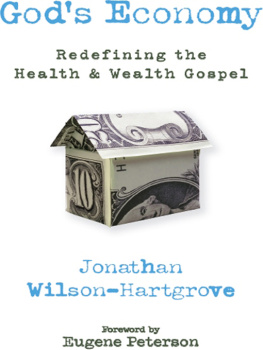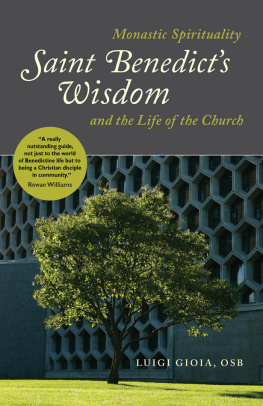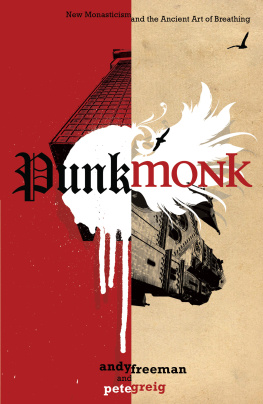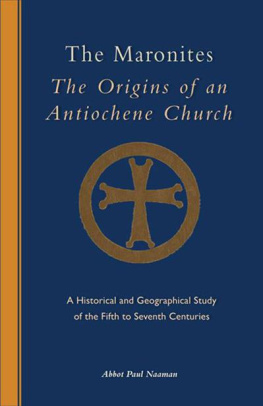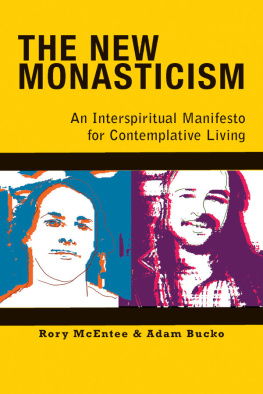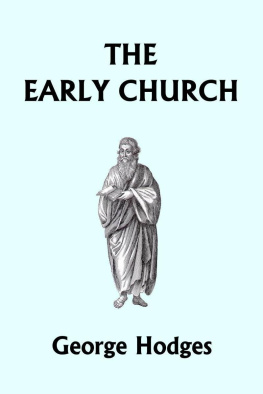Jonathan Wilson-Hartgrove - New Monasticism: What It Has to Say to Todays Church
Here you can read online Jonathan Wilson-Hartgrove - New Monasticism: What It Has to Say to Todays Church full text of the book (entire story) in english for free. Download pdf and epub, get meaning, cover and reviews about this ebook. year: 2008, publisher: Baker Publishing Group, genre: Religion. Description of the work, (preface) as well as reviews are available. Best literature library LitArk.com created for fans of good reading and offers a wide selection of genres:
Romance novel
Science fiction
Adventure
Detective
Science
History
Home and family
Prose
Art
Politics
Computer
Non-fiction
Religion
Business
Children
Humor
Choose a favorite category and find really read worthwhile books. Enjoy immersion in the world of imagination, feel the emotions of the characters or learn something new for yourself, make an fascinating discovery.
- Book:New Monasticism: What It Has to Say to Todays Church
- Author:
- Publisher:Baker Publishing Group
- Genre:
- Year:2008
- Rating:3 / 5
- Favourites:Add to favourites
- Your mark:
- 60
- 1
- 2
- 3
- 4
- 5
New Monasticism: What It Has to Say to Todays Church: summary, description and annotation
We offer to read an annotation, description, summary or preface (depends on what the author of the book "New Monasticism: What It Has to Say to Todays Church" wrote himself). If you haven't found the necessary information about the book — write in the comments, we will try to find it.
Jonathan Wilson-Hartgrove: author's other books
Who wrote New Monasticism: What It Has to Say to Todays Church? Find out the surname, the name of the author of the book and a list of all author's works by series.
New Monasticism: What It Has to Say to Todays Church — read online for free the complete book (whole text) full work
Below is the text of the book, divided by pages. System saving the place of the last page read, allows you to conveniently read the book "New Monasticism: What It Has to Say to Todays Church" online for free, without having to search again every time where you left off. Put a bookmark, and you can go to the page where you finished reading at any time.
Font size:
Interval:
Bookmark:
2008 by Jonathan Wilson-Hartgrove
Published by Brazos Press
a division of Baker Publishing Group
P.O. Box 6287, Grand Rapids, MI 49516-6287
www.brazospress.com
Ebook edition created 2008
Ebook corrections 10.28.2020
All rights reserved. No part of this publication may be reproduced, stored in a retrieval system, or transmitted in any form or by any meansfor example, electronic, photocopy, recordingwithout the prior written permission of the publisher. The only exception is brief quotations in printed reviews.
Library of Congress Cataloging-in-Publication Data is on file at the Library of Congress, Washington, DC.
ISBN 978-1-4412-0136-2
Unless otherwise indicated, Scripture is taken from the New Revised Standard Version of the Bible, copyright 1989, Division of Christian Education of the National Council of the Churches of Christ in the United States of America. Used by permission. All rights reserved.
Scripture marked KJV is taken from the King James Version of the Bible.
Scripture is taken from the HOLY BIBLE, NEW INTERNATIONAL VERSION. NIV. Copyright 1973, 1978, 1984 by International Bible Society. Used by permission of Zondervan. All rights reserved.
For Marti and Jonathan,
whove watched and prayed
I am not in a position to state who is guilty and who is innocent. I am not a judge or a magistrate. Worse still, I am a priest; my duty towards believers is not to try them or to sentence them, but to help them find their way.
Andre Sibomana, Rwandan priest
who survived the 1994 genocide
CONTENTS
READING THE SIGNS OF THE TIMES
Im part of a movement called new monasticism. I dont wear a robe and Im happily married, which is enough to confuse most people. If youll bear with me for a few pages, Ill try to make clear what I mean by new monasticism. For now, just know that it brings me into contact with all kinds of American Christians. And almost everywhere I go these days, people agree that something is wrong in American Christianity. Whether Im talking to Pentecostals or Presbyterians, Democrats or Republicans, academics in a coffee shop or neighbors on their front porch, there seems to be a consensus on this: the church in America isnt living up to what its supposed to be. Somehow weve lost our way.
Now, the minute I try to get specific about what the problem is or solicit ideas about how to fix it, this fragile consensus crumbles into the rhetorical rubble of the culture wars or the impasse of partisan politics. One side says our moral fabric has worn thin and we have to defend the family. The other says were drunk on war and we need to defend the poor. Both camps circle their wagons and insist that their concerns are most important. And pretty soon the conversation is over. Or it turns into a yelling match. Either way, there isnt much hope that the world will know we are Christians by our love for one another. Often we cant even agree that were all Christian.
Which makes it pretty hard to take Jesus at his word. Because whatever else Jesus may have been about here on earth, it seems pretty clear from all accounts that he came to make it possible for those who believe in him to be reconciled to one another and to God. Heres how Paul says it in his letter to the Ephesians: Now in Christ Jesus you who once were far off have been brought near by the blood of Christ.... He has abolished the law with its commandments and ordinances, that he might create in himself one new humanity in place of the two, thus making peace, and might reconcile both groups to God (2:1316). Paul isnt appealing to Jews and Gentiles, begging them to be united because they serve the same God. Hes saying that theyve already been made one. Thats what happened in Jesus. Fragmented peoples can have a relationship with God because they have already been reconciled in a new humanity.
When the Holy Spirit came on the early church at Antioch, Jews and Gentiles alike trusted Jesus to give them access to God. United in worship, they shared life with one another like a family. No one quite knew what to make of this at first. They knew what a group of Jews was supposed to be, and they knew what Gentiles looked like, but they werent sure what to call Jews and Gentiles living and worshiping together in Jesuss name. So they decided to make up a new name. They called them Christians, Acts says (11:26).
Unity across dividing lines was what distinguished the early churchso much so that they required a new name. Christianity was a new identity, neither Jew nor Gentile, male nor female, slave nor free (Gal. 3:28). Thats pretty incredible to think about, especially in a church fractured by schisms and creeds, denominational divides and ethnic identities. Its hard for anybody in America to look at the first Christians and feel very proud about where we are now.
Tragic as our situation may be, though, I think we may have reached a point of clarity here at the dawn of a new millennium. At the risk of focusing too much on the negative, I want to begin with something that almost everyone in the church acknowledges: its hard to be a Christian in America.
Maybe its a little disturbing to think that our difficulty at being Christian is what most unites the church. When it comes to least common denominators, that seems pretty low. But its worth noting that we havent always had this in common. As a matter of fact, much of evangelism in the twentieth century was an attempt to convince Americans of just the opposite that its easy to be Christian in this land of promise. At the opening of the twentieth century, crusaders of the so-called Christian Century heralded the progress of science and civilization, anticipating that they were closer than they had ever been to ushering in the kingdom of God. A few decades later, evangelicals started to employ the new technologies of television and radio to invite people to make a simple choice for Jesus from the comfort of their home. All their listeners needed to do was believe. Christianity couldnt be easier than it was here in the land of the free and home of the brave.
But somewhere along the way, despite the promise of scientific progress and the freedom of democratic society, the signs of the times began to change. The war to end all wars was followed by a second world war that destroyed Europe, introduced the Bomb, and, most tragically perhaps, saw Christians kill fellow Christians by the millions. Still, we called that the good war. Vietnam was the quagmire that broke Americas spirit of optimism, sending baby boomers reeling with a series of revolutions, searching for some place to put their feet on the ground. Evangelical Christianity, which had gone underground fifty years earlier after the embarrassment of the Scopes Monkey Trial, reemerged as a political force bent on restoring the Judeo-Christian values that had been flouted by progressives.
But conservative Christians proved no better than the liberals at stewarding political power or finding an identity that was distinctly Christian. At the beginning of the twenty-first century, Americans are free to be Christian Republicans or Christian Democrats (and they choose to be each in increasingly equal numbers). But we can see more clearly than ever before, perhaps, just how hard it is for any of us to pledge our ultimate allegiance to Jesus. Christian has become an adjective that we tack onto some more fundamental identity. We dont use the word like they did at Antioch, to describe a peculiar people. We dont use it that way because we can feel how hard it really is to be a Christian in America.
Stumbling to Follow Jesus
Much of my generation grew up with this sense that we were living in a post-Christian era. But Ill have to confess that I didnt. I was raised the son of Southern Baptists in King, North Carolina, one of those last bastions of Christendom between the ever-expanding holes in Americas Bible Belt. Born in 1980, I was born again while Reagan was still in the White House. Where I grew up we talked about Jesus like he lived just over the next hill, across from the Flints place. My people taught me to love God and memorize scripture, and I did as I was told. By the time I was in high school, I was certain the Lord had called me to lead the nation in Jesuss name by becoming president of the United States. While still a student in high school, I made my way to DC to work as a page for Strom Thurmond, then president pro tempore of the U.S. Senate.
Next pageFont size:
Interval:
Bookmark:
Similar books «New Monasticism: What It Has to Say to Todays Church»
Look at similar books to New Monasticism: What It Has to Say to Todays Church. We have selected literature similar in name and meaning in the hope of providing readers with more options to find new, interesting, not yet read works.
Discussion, reviews of the book New Monasticism: What It Has to Say to Todays Church and just readers' own opinions. Leave your comments, write what you think about the work, its meaning or the main characters. Specify what exactly you liked and what you didn't like, and why you think so.


